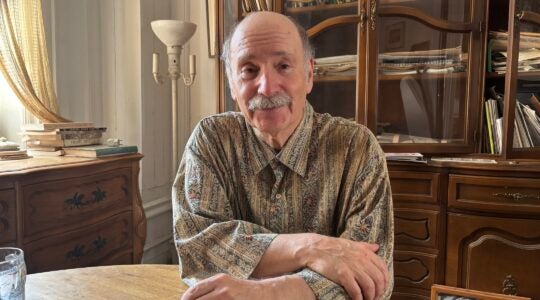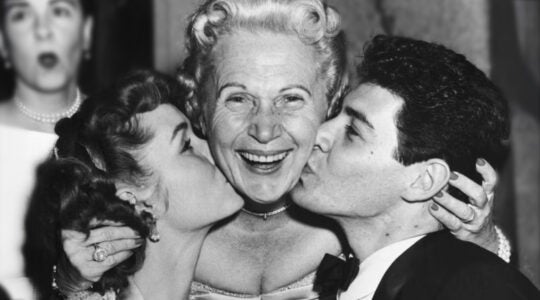Despite a session of raucous testimony on the Israeli-Palestinian conflict on July 9, members of the City Council remain "unequivocally pro-Israel," Speaker Gifford Miller told The Jewish Week.
In his first comments on the hearing that lasted more than three hours, and included a call for an "evenhanded" resolution condemning violence on both sides, Miller said there was no place for what he called a "morally relative" approach when dealing with terrorism.
The controversial resolution discussed before the committee on Cultural Affairs, Libraries and International Intergroup Relations was proposed by Council member Charles Barron of Brooklyn.
"I disagree with Council member Barron’s approach," said Miller. "Some have a tendency to equate terrorism with self-defense, and that’s never acceptable … A vocal minority gets a lot of attention, but I believe the vast majority of the City Council is strongly pro-Israel."
Before the onset of term limits last year, the Council, under former Speaker Peter Vallone, would routinely pass pro-Israel measures, and debates were rare. Commentator Pat Buchanan (who once called Capitol Hill "Israeli occupied territory") might have considered City Hall part of pre-1967 Israel.
But with an influx of freshmen, and with Miller exercising less political control over his members than did Vallone, "immediate consideration" resolutions (which require unanimity) seem to be a thing of the past, with measures instead relegated to committee hearings.
"To the extent that resolutions mean anything, they mean more when they are held in a public way," said Miller. "It’s a healthy thing."
Miller worked behind the scenes for weeks to try to avoid a session that would harm the Council’s pro-Israel image.
To bolster that image, Miller personally sponsored a resolution that denounces suicide bombings, and will travel to the Jewish state in August on a mission sponsored by UJA-Federation to show solidarity. He said he hopes the trip will foster "a greater understanding for the leaders of the city about the state of the conflict."
As for a measure sponsored by G. Oliver Koppell of the Bronx calling for the closure of Palestinian diplomatic offices here (also discussed at the July 9 hearing) Miller said he had no regrets about freezing the resolution in deference to a request from the State Department.
"It was not an unreasonable request," said Miller. "But we didn’t hear anything again, so we went forward [with the hearing]."
Although he believes the Palestinian Authority, like Iraq or Syria, is "responsible for terrorism," Miller said he had concerns about the Koppell resolution, initiated by Bronx Rabbi Avi Weiss, because of New Yorkís commitment to hosting diplomatic entities. But he said he was working with Koppell to adapt language that would respect that obligation while condemning Palestinian terror.
In other comments Miller said he was "proud" that the Council had restored the "vast majority" of budget cuts to social services proposed by the Bloomberg administration.
Those cuts could have had a drastic effect on such agencies as the Metropolitan Council on Jewish Poverty.
"We believe that Jewish organizations like Met Council provide an extensive level of incredibly needed services to the elderly and youth and communities across the city," said the speaker.
While the budget wasn’t exactly thrilling news for Jewish agencies who rely on city funds, it could have been much worse.
"In a difficult year, we were pleased that the mayor and City Council leadership, while not holding us harmless, were able to mitigate a substantial portion of the cuts," said Ron Soloway, UJA-Federation’s lobbyist. Among the restorations was an across-the-board 2 percent cut to all senior contracts, and a weekend hot meal program.
Less fortunate was a program run by Met Council providing free handyman services to improve the safety and security of homebound seniors, which faces extinction when private funds run out.
And for the second time in two years, a cost-of-living adjustment was denied for workers in programs for the aged. "This will severely affect the ability of our agencies to provide quality services," said Soloway. But he noted that most funding to City Council members for community programs in their districts had been maintained. "We’re pleased that Council initiatives for ESL classes for immigrants received about 80 percent of their funding, and the same is true for monies for the mental health system."
The gloom of budget cuts at Met Council may have been lifted somewhat by President George W. Bush, when he singled out the organization in a speech about faith-based initiatives.
Speaking in Milwaukee on July 2, Bush described the group as "people who want to help; they feed the hungry for their community. They feed the hungry regardless of somebody’s religion. They don’t ask, what is your religion; they ask, Are you hungry? But because of their name and their identity, federal officials have repeatedly discouraged them from applying for federal funds."
Met Council director William Rapfogel met with Jim Towey, Bush’s director of faith-based initiatives, to discuss the group’s work and was later informed in advance of the mention. A week later, Rapfogel had the chance to thank the president on his arrival at JFK Airport, when he was one of five New Yorkers to greet the commander-in-chief on the tarmac.
Andrew Cuomo may be the first candidate in memory to visit Israel twice during the same political campaign. Cuomo, who is seeking the Democratic gubernatorial nomination, last visited the Jewish state in April, on the heels of a trip by his rival, H. Carl McCall. This time, the purpose is "again to show solidarity," says campaign manager Josh Isay, noting the terror attack that killed seven in Immanuel Tuesday. "Also, the Israeli economy is in some danger and we want to see if there are ways we can work together to help save [it]."
The itinerary of the trip, planned for early August, is still in discussion, said Isay, noting that Cuomo would foot the bill himself.
Concern about recent anti-Jewish terror threats has extended to the Catskills, where thousands of Jews will gather this weekend. Assembly Speaker Sheldon Silver has called on the State Police to increase their presence to help reassure vacationers, who typically flock to the mountains in greater numbers during the first Shabbat after the Tisha b’Av day of mourning, known as Shabbat Nachamu, or comfort.
"There have been some concerns, and we want to help reassure folks," said Silverís chief of staff, Judy Rapfogel, who said there have been no specific threats reported. Police told Silver they would try to increase visibility in such areas as Monticello, Liberty, Woodbourne, South Fallsburg and Swan Lake, where Jewish bungalow colonies and vacation centers are concentrated.
The New York Jewish Week brings you the stories behind the headlines, keeping you connected to Jewish life in New York. Help sustain the reporting you trust by donating today.




